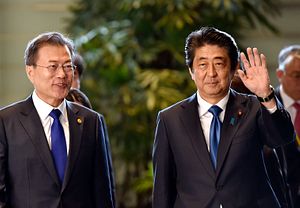The second meeting between the leaders of the U.S. and North Korea in Hanoi earlier this year challenged the conventional wisdom that there is no such thing as a failed summit when it ended without any agreement being signed. The widespread consensus is that the Trump administration was responsible for the breakdown of the talks.
For the Japanese government, though, the outcome was acceptable, given that the Trump administration, which had been taking advantage of joint projects between North and South Korea to proactively negotiate with Pyongyang, halted the talks calmly. While this was a setback for North Korea’s Kim Jong-un, the hardest blow was to the government of South Korea’s Moon Jae-in. Just before the summit, the South Korean president shared his vision for a proposed “new Korean Peninsula regime” designed to kick-start economic cooperation between North and South by resuming tourism at Mount Kumgang and operations in the Kaesong Industrial Region. That vision was derailed. South Korea must step up its intermediary role between the United States and North Korea. This will not be easy now that the yawning gap between the United States and North Korea has been exposed. Can the Moon Jae-in administration effectively balance relations with both Washington and Pyongyang? In fact, the US-ROK summit on April 12 ended in failure because Moon could not persuade Trump to ease the sanctions against North Korea.
Meanwhile, some observers are laying the blame for the failure of the talks at Japan’s feet, as shown by statements emerging from Korean government circles that Tokyo wanted the negotiations to break down and used its influence to achieve that outcome. Similar criticisms have emerged from North Korea. There is no doubt that the Japanese government lobbied not only the Trump administration but also the diplomatic establishment in Washington, so that President Donald Trump would not go too far in compromising with North Korea. Really, it is hardly surprising that the Trump administration would ensure that its impatience for success did not harm the interests of its ally Japan.
However, if North Korea’s denuclearization project is to succeed, the South Korean government should not slacken in its efforts to obtain support, emphasizing the fact that the project would benefit both the United States diplomatic establishment, including the Democratic Party, and Japan. This is not easy, but without this effort it is clear that South Korea will not be able to realize its vision.
However, the Moon Jae-in administration has struggled in this regard. In Washington, the thinking is that it is doubtful that the denuclearization of North Korea can be achieved through the Moon Jae-in administration’s policy of appeasement. Meanwhile, a series of historical grievances, including the issue of comfort women and that of conscripted factory workers, has had adverse impact on relations with Japan, which has now lost all trust in the South Korean government.
The argument that Japan was behind the breakdown of the Hanoi talks overstates Japan’s diplomatic clout. Ever if it were true, then one must ask why South Korea didn’t make the effort to win Japanese support first, at the very least by maintaining good relations. The thinking that Japan does not want Korean unity is misplaced: Japan is not opposed to South Korea-led unification. Rather than misguided assumptions, South Korea should be working to win Japanese support by highlighting the benefits of unification.
To be clear, the Moon Jae-in administration’s efforts should be applauded. They will have a positive impact on the security of Japan, the Korean Peninsula, and Northeast Asia. If the scenario envisioned by South Korea eventuates, that would all for the better. However, the state of relations between South Korea and Japan remain a significant impediment, which will require some serious diplomacy to overcome.
South Korea has its own domestic politics to consider, and so compromise with Japan on historical issues will always be difficult. However, the current policy in Seoul seems to suggest no forward movement at all. Of course, this can’t be attributed entirely to the government of Moon Jae-in; in the current climate, it is difficult for Japan to be proactive as well. Still, given the importance of North Korean denuclearization for Japan’s security, the rational choice for Tokyo is to let go of its distrust and work with South Korea to achieve that outcome.
Tadashi Kimiya is a professor at the University of Tokyo.

































